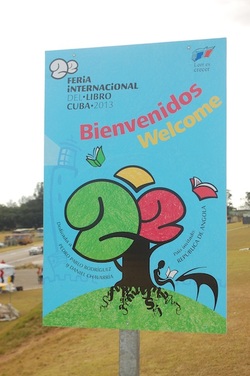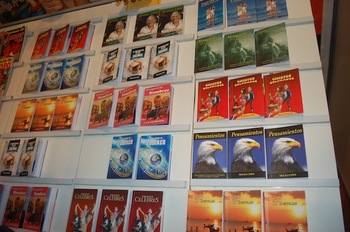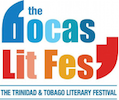
The numbers alone are staggering: 140+ exhibits; 100+ events per day; 400 foreign delegates from 40 countries; 11 days of book launches, readings and performances; 12 venues across the city, including the sprawling Cabaña Fortress – a massive 25-acre historic site that serves as the Fair’s hub; on average, more than 20,000 visitors per day.
And that’s just the warm-up.
When the curtain comes down in Havana on February 24, 11 days of non-stop activity after its Valentine’s Day start, the Fair repeats its combination of book sales and supporting events on a tour through all 14 of Cuba’s provinces, culminating in Santiago de Cuba.
By the time the fair ends in Santiago de Cuba – after 30 days in total -- more than 140,000 books will have been sold and more than 1,000,000 Cubans will have come out for the event.

“Everybody [looks forward to] the book fair,” says Aida Bahr of the Instituto del Libro (Cuban Book Institute), the state agency responsible for coordinating the fair. “It’s the cultural event that gets to everyone, everywhere. Most of our books are launched at this time of year for the fair, so it’s a great opportunity to buy new books.
“It’s not just book launches and sales, but a very wide programme of activities: conferences, meetings of librarians and historians, literature and social science conferences. There are meetings with publishers to discuss important issues [as well as] meetings with foreign publishers.”
Every year the fair honours one country and two outstanding Cuban writers – a fiction writer and a social scientist. The selections influence much of the programming. This year’s honoured country, Angola, brought a delegation of more than 100 writers, performers, academics and cultural representatives to the Fair, to showcase Angolan culture in all its forms and Cuban publishers released 18 new editions of Angolan books for the local market.
It’s the combination of new Cuban books, the opportunity to learn about other cultures and the sheer magnitude of the spectacle that draws the Cuban audience year after year for an event that feels more celebratory than cerebral.
That’s what the Instituto del Libro and its partner planning agency the Camara del Libro (Chamber of Books) are banking on. (Yes, Cuba has a Chamber of Books, like a Chamber of Commerce; a state run agency to tend to the business of its books. The Chamber runs logistics for the fair as well as a summer slate of book related activities during the summer holidays and manages Cuba’s participation in international book fairs.)
“The mission of the Havana Book Fair is to give the people access to books,” explains Bahr. Jesus David Curbelo who coordinates the fair’s mammoth schedule of literary, academic and professional events notes that the mission isn’t necessarily to get people to buy books during the fair. “A lot of people come just to have fun… It’s part of our cultural tradition and [it has made] people very interested in reading.”
The human and financial resources invested are signfificant -- the organizing committee has more than forty members and with the staff of the Instituto del Libro and the Camara del Libro, the full team numbers into the hundreds. The budget for domestic expenses alone; i.e. salaries and things that do not have to be imported, run into the millions. But the fair isn’t expected to make a profit. As with all books published in Cuba, the book fair itself is subsidized by the government, with the long term goal of promoting reading and strengthening Cuban culture.
“The point of it is to make a cultural investment,” says Bahr.
“It’s an investment in the people.”

 RSS Feed
RSS Feed


